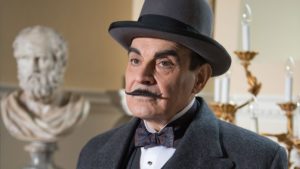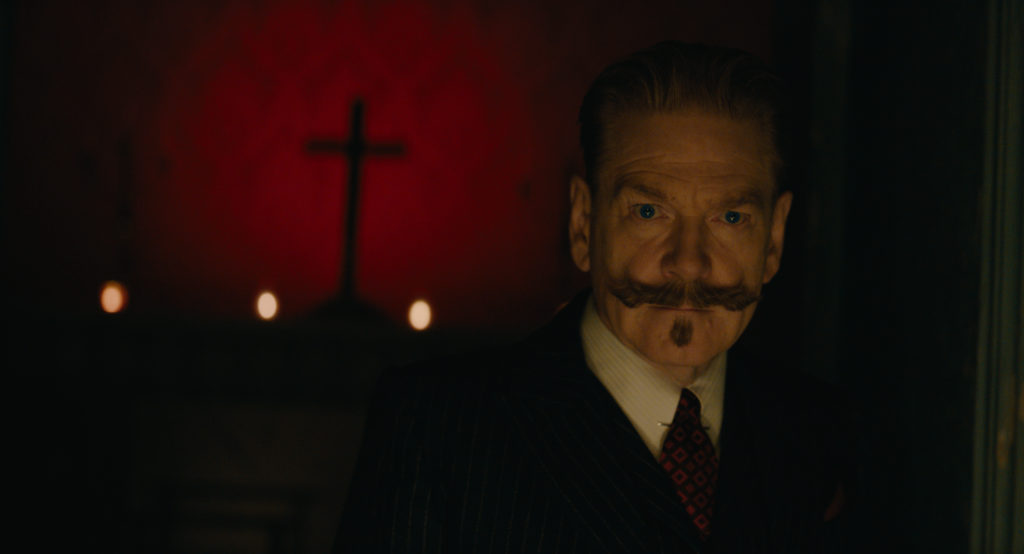Whenever I ask a girl for her number, or in one of those folkloric moments where she takes the initiative, the first obstacle we face in our budding romance is my smartphone wallpaper.
As I swipe my phone on, a picture of a portly fellow in a homburg hat appears. He most closely resembles a penguin, but with a neatly clipped mustache. This is Hercule Poirot, and he is my best friend.
Poirot is Agatha Christie’s most famous creation, the little Belgian detective of “ze little grey cells.” Considering that Christie has sold more books than the Bible, Poirot himself might have better claim to John Lennon’s famous boast about the Beatles. Twenty-seven actors have played Poirot over the years, most recently Kenneth Branagh in his trilogy of Christie adaptations. “A Haunting in Venice,” a retelling and retitling of Christie’s “Hallowe’en Party,” recently hit theaters just in time for the spooky season.
Poirot himself is not a complicated character. On the page, he is not much more than a collection of affectations. The challenge — or perhaps the privilege — of the actor portraying him is to find the human among the huffy mannerisms. It’s in these distinctions we see what the actor values, and what the actor values is often a reflection of what his era values as well. Poirot is like the role of Hamlet in this regard (or like America’s Hamlet, the Joker).
Your favorite Poirot is likely your first, and mine remains David Suchet in “Agatha Christie’s Poirot,” (1989) the man currently peeking out from behind my apps. I was introduced to him and the show in college by a friend, and we made a habit of watching one episode every Sunday evening to ease ourselves back into the week. Our other roommates and friends were confused at first, but by the end of the year the room was crammed with smelly college boys, channeling the remaining fervor of Sunday Night Football into hollered accusations at the scullery maid.

Suchet’s genius was to deepen, not create. The Poirot from the stories was still there: the fussiness, the egotism, the love of a past that likely never existed. But other actors put on those traits like a jacket, Suchet wore them as a skin. I’m not kidding when I say I consider him a friend; I am a man who has casually watched a college class worth of coeds perish in the “Friday the 13th” movies but only made it two minutes into Suchet’s final episode. I couldn’t face saying goodbye to an actor I never met, playing a detective who doesn’t exist.
Suchet found common cause with Poirot in their shared Christianity. Christie made sporadic mention of Poirot’s Catholicism, mostly as an extension of his gently reactionary worldview. (It was one shared by the author herself, who despite not being Catholic protested the introduction of vernacular in Mass.) Suchet, an Anglican, imbued his more sincere spirituality to the character, especially in later seasons.
His faith could be a feature of his ego, like in “Murder On the Orient Express” when he prays thanking God for making him Catholic. But more often, it is a refuge from a world he no longer understands, and one that no longer bothers understanding him. In one moving instance, he gives a victim his rosary, urging her to turn to God, “for without Him is but madness.” Poirot’s ordered world can’t survive the chaos of the 20th century, so he clings to his faith as a lifeline to sanity.
In the more recent “A Haunting in Venice,” director and star Kenneth Branagh tackles the same problem but comes to a different conclusion. His Poirot is a broken man, first by his service in World War I and then its echo in World War II. He retreats to Venice, ignoring calls from clients and friends alike.
A woman who is both, mystery author Ariadne Oliver (Tina Fey), entices him out of hiding to debunk a medium (Michelle Yeoh) who is holding a séance in a nearby palazzo. The owner is desperate to speak to her daughter again, who leapt from the balcony into the water a year prior. This Poirot insists he no longer believes in God, but then no man feels this much anger at something he doesn’t think is real. When was the last time you saw a blood feud against a unicorn? He attends at any rate.
This is a Christie story, so it’s no spoiler to say the séance is interrupted by a murder. Wherever Poirot goes, homicide tends to follow, he’s like an Angel of Death from the land of chocolate. (When given the option, it’s safer to share a train compartment with enriched plutonium.) The guests are split on whether the slaying is supernatural. Some, like the former nun turned devout housekeeper, entertain no other option. Others like Poirot trust the evidence, except when the evidence points to something they’d rather not believe.
The film doesn’t offer answers to the mystery of the afterlife, or even if Poirot returns to his faith. But the film features a recurring motif of filled teacups balanced on a table’s edge, an unsubtle metaphor for all the séance guests, all of whom are teetering on the edge in some form or other. After all, no one who questions the dead is getting the answers they want out of life. When a cup falls, its splash visually parallels the suicide splash of a certain young girl.
In the final shot of the film Poirot nudges his teacup back onto the table. If still without all the answers, he has at the very least chosen life. And if death happens to follow this Poirot about, he should hardly be surprised to embrace life and find God around the corner.

